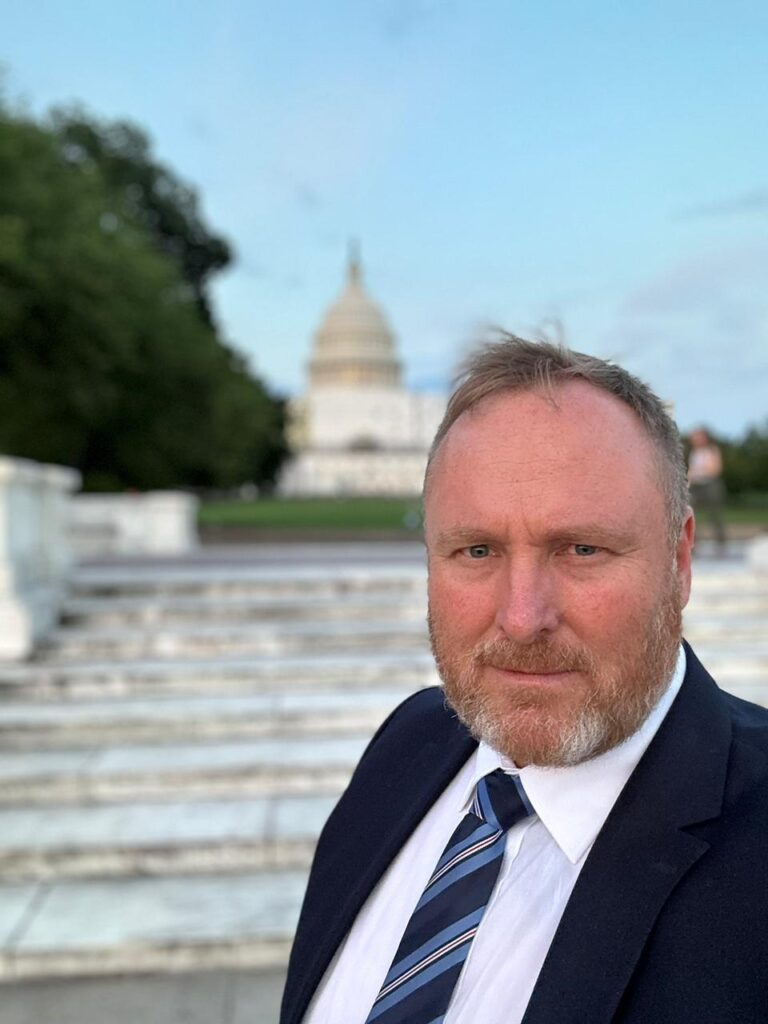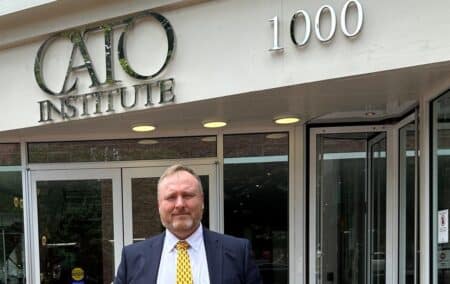South Africa’s ‘greatest opportunity for the future’ is to be found ‘in its innovative and resilient private sector and civil society, which are solving problems in the growing absence of the state, and doing so successfully’, John Endres, CEO of the Institute of Race Relations, has told the Cato Institute in Washington DC.
In his briefing to the Institute in the course of an extended visit to the United States this month, Endres said: ‘In years to come, South Africa may well become a case study of how private initiative succeeds where states fail.
‘And in future, South Africa could end up with an enabling, compact state – or a “lean state” which cooperates with non-state actors instead of trying to stifle their efforts – with valuable lessons even for the developed world.’
His briefing – published in full on the IRR website – is titled, South Africa’s Third Age: What lies ahead?

IRR CEO John Endres in Washington, with the Capitol in the background
Endres noted that the word ‘crisis’ was now ‘commonly invoked’ in writing on South Africa, with the expression ‘failed state’ having been added to the list since the beginning of the year. A ‘broad range of commentators both local and global’ were also now ‘red-flagging South Africa’s current trajectory’.
Yet, he observed, while the state ‘might be trying to expand its influence by passing laws and regulations, and by announcing grandiose schemes such as smart cities and bullet trains, its declining capabilities mean it is unable to implement its plans’.
‘A famous South African example involves an electronic highway tolling plan in Johannesburg which was installed at high cost, but failed because of dismal compliance – over 90% of drivers simply refused to pay. It is just one example of many where citizens are increasingly ignoring the government.’
Endres added: ‘As the state becomes less and less capable, it is being increasingly bypassed by private actors. This process has been underway for a considerable time already. Those who can afford it rely on private healthcare and schooling, of a quality far higher than that provided by the state. In the absence of reliable electricity from the state-owned utility, those who can afford it install solar power on their rooftops. The installed capacity has doubled over the past year, to over 4 000 MW nominal. Calls to the police often go unanswered, with the emergency number 10111 sitting at a 40% staffing level and dropping millions of calls. In response, South Africans make use of private security companies that are highly trained and effective – and whose staff now outnumber the police force by a 4:1 ratio. When a wave of riots and looting rocked the KwaZulu-Natal province in 2001, citizens protected their property while the police and army were conspicuous by their absence.’
Endres noted that such ‘replacements of state services by private entities’ were taking place across the country.
‘In urban areas, residents’ associations are fixing potholes, while in rural areas, farmers do the same. Civil society organisations like Solidarity are building technical schools and universities. Trash recyclers control traffic intersections when the lights are out. Large corporations provide security along freight rail corridors, while mining companies build clinics and provide housing and water near mines. Providers of mediation and arbitration services help resolve disputes without the involvement of the courts. Farmers help repair the water infrastructure where state neglect has left it derelict.’
He acknowledged that the state often ‘still gets in the way of these solutions’.
‘Government agencies prevent private medical insurance companies from offering cheap plans for low-income groups, and limit the number of nurses that private hospital groups are allowed to train. City entities circulate memos reminding citizens that it is illegal for anyone but themselves to repair potholes. The state power company prevents a private electricity company from reducing the intensity of rolling blackouts in the town of Frankfort.’
However, these were ‘rear-guard actions by a weakening state’ which was ‘increasingly making itself irrelevant’.
Overall, this was a ‘more nuanced and optimistic view’ of South Africa than was suggested by the increasingly popular ‘failing state’ narrative.
In closing, Endres told his Washington audience that, as he continued his meetings in the capital ‘to shore up support and build relationships’ with the many people and organisations sympathetic to South Africa, he would encourage them ‘to look closely at this complicated but fascinating country – and to observe both that which is seen and that which is not seen’.
[Image: John Endres, CEO of the Institute of Race Relations, at the Cato Institute in Washington DC]

